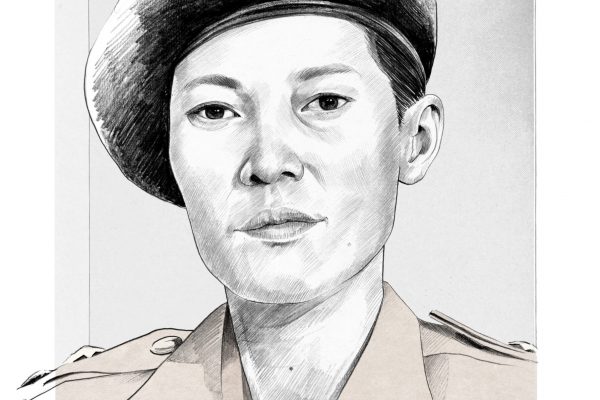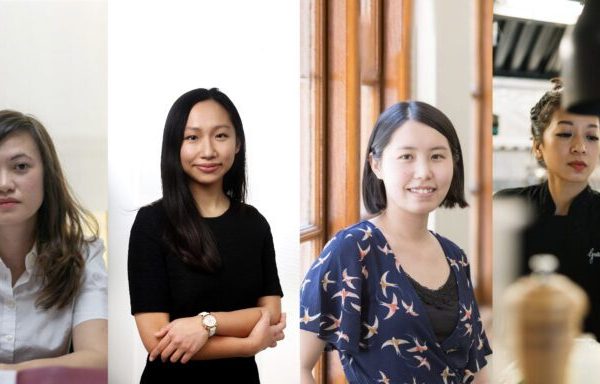Hearts & Minds: Teaching LGBT+ acceptance in schools
When she was two years old, Hung Hung* announced that she was a boy. Open-minded, her parents allowed her to play with boys’ toys, cut her hair short, and wear what she liked.
But her mother, Wong* felt it was “too early to say that she identifies as a trans person,” choosing instead to describe her daughter as “gender-diverse.”
While Wong could easily manage these decisions at home, she realised that Hung Hung was likely to face challenges at school. The first test came when the four-year-old had to try on school uniforms.
Standing in the lobby of her local Chinese-language elementary school, Hung Hung pointed to the rack of clothes and asked to wear the boys’ style. When Wong asked the principal whether her daughter could wear trousers instead of a skirt, he said no.
Hung Hung expressed disappointment, but her mother explained they had to follow the school’s rules.
“It was a chance to explain to my daughter that, sometimes, you don’t get what you want,” Wong says. “We should fight for what we believe in, but if it doesn’t work out, we should still follow the rules.”
Now six, Hung Hung has a fluid gender identity: She uses female gender pronouns and is active and rambunctious “just like a little boy” might be expected to behave, Wong says.
But as a gender-diverse child, Hung Hung is growing up in a system that may not recognise or accept her unique identity.
When it comes to education, Hong Kong has an enviable reputation. According to Pearson’s 2014 Global Index of Cognitive Skills and Educational Attainment, the region ranked fourth in the world behind South Korea, Japan and Singapore.
While the city’s demanding curriculum produces a stream of successful graduates, LGBT+ and sex education advocates often criticise the system for being rigid and narrow in scope when it comes to covering sex education, diversity and human rights – topics which experts believe should be taught from a formative age.
One vocal critic is Diana Kwok, an associate professor in the Department of Special Education and Counselling at the Education University of Hong Kong, who believes LGBT+ issues should be covered within the broader sex education framework.
“Sex education is not just about sexual behaviour or the prevention of HIV and other sexually transmitted diseases,” says Kwok, who passionately contends that sex education should include “human rights, values, equality, and diversity.”
Kwok cites her own children, now aged 13 and 18, as examples. “Starting from when they could talk, we began discussing sex education,” she says.
“We have gay and lesbian friends who have children, so we talked about how families can consist of two parents, just a [single] mum or dad, another family member, or even two mothers or two fathers in a relationship together.”
More importantly, Kwok says sex education should be extensive and taught “as early as possible.”
A Repressed Curriculum
Hong Kong’s sexual education curriculum has not been updated since the handover from British to Chinese administration in 1997.
And over the past two decades, the government has continued to issue the same set of loose guidelines to schools as a reference for educators that “should not be regarded as a curriculum guide.”
Critics of the guidelines, such as Kwok and local former legislator Ray Chan, argue that the current materials neglect important terms such as “gender equality” and “gender identity,” including only brief mentions and unclear definitions.
Sex education is not just about sexual behaviour or the prevention of HIV and other sexually transmitted diseases, it should include human rights, values, equality, and diversity.
Diana Kwok
The Hong Kong government’s 2018 information note on the subject mentions “transgenderism” in passing and refers just twice to the term “human rights.”
During a government panel held in 2018, Chan said he believes the guidelines mischaracterise non-binary gender identities as “a choice” rather than innate identity.
According to sex educators like Kwok, it is not just children who are in need of guidance; parents also need help.
Kwok, who has worked with parents whose elementary or secondary school children identify as LGBT+, believes that schools need to provide more support in this area, specifically “concrete, up-to-date information” on the concepts of sexual orientation, gender dysphoria, and diverse identities.
For instance, when Kwok’s son was in primary school, he asked her about the annual Hong Kong Pride Parade, which takes place every November.
“We talked about some gay and lesbian family friends who were not being recognised in society. These groups need a voice and should be considered equal to others,” she says.
Unfortunately, many schools are unable or unwilling to offer parents and students clear guidance on these issues, often for fear of fielding complaints from conservative parents or religious groups. “
With British colonialism came Christianity and Catholicism, so the education system here is influenced by religion,” says Kwok.
“There are active anti-gay groups in Hong Kong pretending to be religious groups, and every time [we] discuss LGBT+ education or issues, these groups become extremely vocal.” Kwok declined to name these groups for legal reasons.
Access to Information
Vincy Chan, a 28-year-old transgender, non-binary singer-songwriter and trans activist who uses the pronoun ‘they’, grew up in such a system.
They attended two Chinese-language Anglican girls’ schools in Hong Kong until Form 6, when they switched to an international school. In their local secondary school, Chan says many of their classmates identified as gay or bisexual.
“In high school, there were a lot of people who were dating. You’d always be talking about who was a tomboy and stuff like that,” says Chan. “Our teachers wouldn’t address it and staff didn’t talk about it. In general, you had to be polite, ladylike, like you were a woman of the future.”
While Chan knew they were part of the LGBT+ community from a young age, it wasn’t until they graduated from university that Chan more specifically identified as transgender and non-binary (a person who does not identify as exclusively male or female).
“There were moments in my primary and secondary years where I felt like I was doing this woman thing wrong, but I just couldn’t put it into words. Now that I think back on it, I’m like, of course, I’m trans.”
Chan says they didn’t know any transgender people until they went to college, even though they attended an international secondary school for Form 6 and 7. “In college, I had a lot of classmates who identified as trans and they were very vocal about it.”
It was during this formative period that Chan began to discover books about gender and different forms of gender expression including Ivan Coyote’s Tomboy Survival Guide.
“[It’s] about having access to free information. Personally speaking, I wish there had been more information out there [when I was growing up in Hong Kong].”
Another issue when it comes to access is language, Chan says. “I can see a huge discrepancy between the amount of English- versus Chinese-language information. I know quite a few trans-identifying Hongkongers whose first language is Chinese, and for them, it’s a lot harder to find information.”
Despite the lack of reliable sources for transgender children and teens in schools, Chan says that many young people today can learn about LGBT+ issues through social media.
“Instagram and Facebook are full of accounts with people documenting their journeys and figuring out their identities. Compared to when I was growing up, people can find out [about these issues] at a younger age.”
Stronger Support Systems
Having strong support systems at home and at school remains a challenge for many LGBT+ children. Geoff Wheeler is the vice-principal of secondary at Renaissance College, a private, secular international school located in Ma On Shan, where he also oversees the school’s student wellbeing programme.
Established in 2006, Renaissance College is unique among Hong Kong schools in that it teaches students about sexuality, reproduction, and the LGBT+ spectrum from a young age.
“For us, the whole notion of gender, values, and sexuality are taught from the moment they arrive. It begins in year one [when children are six and seven years old],” Wheeler says, citing examples such as normalising same-sex relationships and family constructs.
“From about nine or 10 years old, they’re ready to talk about it [openly in school]. It’s in the media they consume anyway [like Netflix and YouTube], so we focus a lot on overcoming stereotypes and empowering them to look at the world around them.”
For Wheeler, it’s about “respect and creating a positive social climate. You do that with everyone being openly respectful of gender and sexual identity. At our school, we have a few openly LGBT+ students who feel confident and safe enough to express who they are.”
Wheeler supports his students and, if needed, assists them in broaching the topic with their families. In one recent case, a 13-year-old female student came out to her friends as gay.
“Her friends supported her, which gave her the confidence to tell her parents [a few months later],” says Wheeler. “At first, her parents were horrified. They said to her ‘your life is going to be so difficult’ and ‘this is just a phase.’”
The student became depressed and her grades began to suffer, so Wheeler contacted her parents, who are Christians, to discuss their daughter’s grades, as well as issues around sexual orientation.
“I asked them what their biggest fear was. The parents said they were worried that their daughter’s life would be difficult and that she would face prejudice. It was a big moment for the family,” says Wheeler. “The student told her parents they were right, [she would face difficulties] but she wanted to lead a true life with their support.”
No matter how much the child is struggling, they have to know that they are loved.
Geoff Wheeler
Wheeler says the key is to be non-confrontational when he talks to parents about their child’s sexual orientation or gender identity. “A parent may have said hurtful things to their child, but the worst thing you can do is have a meeting where you castigate and confront them.”
Instead, he tells parents that he recognises the difficulties and builds rapport from there. “Some parents are coming in with so much baggage. They’ve never been through this, so you sit alongside them, and you don’t judge.”
It’s a long and difficult journey, and Wheeler readily concedes that as accepting as the school might be, the outside world is different.
“We want students not just to accept the world, but to challenge it. They know you don’t just come out and it’s all easy [and over].” But no matter how much the child is struggling, Wheeler says that they have to know that they are loved.
Wong, the mother of gender-diverse six-year-old Hung Hung, wholeheartedly agrees. As a parent, she says it’s her job to provide love and accept her child’s gender expressions. “When Hung Hung first told me she was a boy, I thought to myself: ‘It’s okay. If she wants to be a boy, she can be a boy.’”
An increase in social awareness and acceptance has also helped Hung Hung grow by leaps and bounds, she adds. For example, Hung Hung’s local elementary school allowed her to wear a boy’s costume while dancing on stage with her class at their end-of-the-year performance.
“On the day of the performance, she was the only ‘girl’ wearing a boy’s costume,” says Wong. “Of course, she didn’t know what [a great victory] this symbolised, but she was really happy.”
*Names have been changed to protect the privacy of the individuals.

